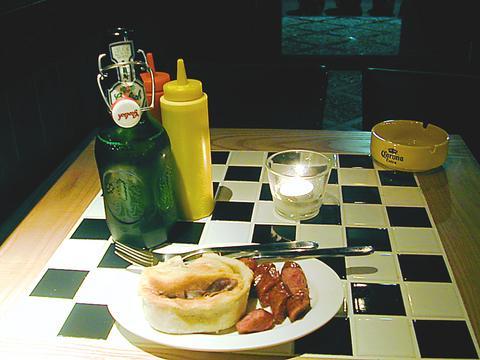It's maybe a little unusual to include a bar in a restaurant column, but occasionally someone will hang a shingle outside a new establishment that warrants a mention. Bobwundaye is such an establishment and the someone hanging the shingle is none other than Cathy Chiou, whom barflies may know better by her past incarnation, "Cathy at DV8."
For the unfamiliar, DV8 is one of the city's longest-running pubs (not to be confused with those establishments that serve beer with ice). For years it served as the penultimate square in a hopscotch of drinking holes that included 45, Spin, Roxy Plus (now Roxy 99), DV8 and Roxy Vibe in its previous location. Every Friday and Saturday night, the sidewalks connecting these locations became strewn with empty bottles and cans, cigarette butts and a few fallen comrades.
Not long ago, DV8 held a special, smoke-filled place in the hearts of barflies and was abuzz throughout the week. Cathy earned a special place, too, dispensing tequila like medicine to legions of battle-worn English teachers. Her departure has robbed the old barhopping circuit of the last of its charms and left behind only the bottles, cans and fallen comrades, who are wondering where Cathy went.

PHOTO: DAVID MOMPHARD, TAIPEI TIMES
Answer: Bobwundaye, where she's transcended the role of barmaid and become the boss (She wears the role well, too; standing several centimeters taller behind her new bar.)
Less than a month old, Bobwundaye offers all the trappings of a pub without the smoke-stained walls. At 14 ping, it's intimate to say the least, but a nice design and even nicer company make it more cozy than cramped. The menu, scratched on a board above the bar, consists of several sausages, excellent fries and some very tasty meat pies -- all served with the same friendliness and honesty that those who know Cathy take for granted. "Don't eat the chicken," she says. "It's not so good." All the pub grub runs around NT$100 to NT$150.
But of course the grub exists mostly to allow you to drink more and it's here that Bobwundaye wins the audience. From 9pm to 11pm, Heineken is 50 percent off at NT$60 per bottle, with other drinks specials later.

Towering high above Taiwan’s capital city at 508 meters, Taipei 101 dominates the skyline. The earthquake-proof skyscraper of steel and glass has captured the imagination of professional rock climber Alex Honnold for more than a decade. Tomorrow morning, he will climb it in his signature free solo style — without ropes or protective equipment. And Netflix will broadcast it — live. The event’s announcement has drawn both excitement and trepidation, as well as some concerns over the ethical implications of attempting such a high-risk endeavor on live broadcast. Many have questioned Honnold’s desire to continues his free-solo climbs now that he’s a

Lines between cop and criminal get murky in Joe Carnahan’s The Rip, a crime thriller set across one foggy Miami night, starring Matt Damon and Ben Affleck. Damon and Affleck, of course, are so closely associated with Boston — most recently they produced the 2024 heist movie The Instigators there — that a detour to South Florida puts them, a little awkwardly, in an entirely different movie landscape. This is Miami Vice territory or Elmore Leonard Land, not Southie or The Town. In The Rip, they play Miami narcotics officers who come upon a cartel stash house that Lt. Dane Dumars (Damon)

As Taiwan’s second most populous city, Taichung looms large in the electoral map. Taiwanese political commentators describe it — along with neighboring Changhua County — as Taiwan’s “swing states” (搖擺州), which is a curious direct borrowing from American election terminology. In the early post-Martial Law era, Taichung was referred to as a “desert of democracy” because while the Democratic Progressive Party (DPP) was winning elections in the north and south, Taichung remained staunchly loyal to the Chinese Nationalist Party (KMT). That changed over time, but in both Changhua and Taichung, the DPP still suffers from a “one-term curse,” with the

Today Taiwanese accept as legitimate government control of many aspects of land use. That legitimacy hides in plain sight the way the system of authoritarian land grabs that favored big firms in the developmentalist era has given way to a government land grab system that favors big developers in the modern democratic era. Articles 142 and 143 of the Republic of China (ROC) Constitution form the basis of that control. They incorporate the thinking of Sun Yat-sen (孫逸仙) in considering the problems of land in China. Article 143 states: “All land within the territory of the Republic of China shall